Hello to my fellow empaths (a term defined by researchers as ‘the opposite of psychopaths’). As a group, we’re benefited and handicapped by our sensitivity to other people’s feelings. It’s what keeps us from torturing and killing humans and other animals—it’s also what might stop us from becoming CEOs, surgeons, and military generals, professions that require their practitioners to do things like sabotage colleagues, cut open brains with steady hands, and easily weigh the cost-benefit analysis of murdering x-number of civilians to wipe out one prolific terrorist cell. As Paul Frick, a psychologist at Louisiana State University, puts it, “They don’t care if someone is mad at them. They don’t care if they hurt someone’s feelings. If they can get what they want without being cruel, that’s often easier, but at the end of the day, they’ll do whatever works best.”
As someone who cares way too much what other people feel, female psychopathy, in particular has always fascinated me. The idea of another woman skating through life without any shame brings both admiration and a touch of jealousy. Wouldn’t it be nice to never feel afraid? To feel beautiful, brilliant and successful at all times? To not care what other people think, because you think you know best?
Of course, empathy proves preferable in the long run. Psychopaths love being loved, but cannot think of other people as anything more than possessions. They operate on pure self-interest at the expense of emotional connections—and while aloneness doesn’t necessarily strike them with a sense of deprivation (they love themselves too much to ever feel truly lonely), trading places with them would rip away the joy, warmth and love that make our empath lives worth living. In her book, Confessions of a Sociopath, female psychopath M.E. Thomas—who prefers the term “sociopath,” a phrase used to describe “pro-social” psychopaths (i.e., people who use their psychopathic traits for self-advancement, without ever breaking the law)—describes her capacity for human connection like this: “I’ve allowed myself to be tamed by people in order to have longer-lasting relationships, but the animalistic urge to destroy is always bubbling underneath the surface.”
My first true crime book, Slenderman: Online Obsession, Mental Illness, and the Violent Crime of Two Midwestern Girls, is not about psychopaths. (Morgan Geyser, the primary assailant in the Slenderman case, was 12 years-old at the time of her crime, and suffered from undiagnosed, early-onset childhood schizophrenia. Her co-defendant, Anissa Weier, was also 12 and dealing with a mental illness. The State of Wisconsin prosecuted both little girls as adults. Slenderman provides the first full account of the case.) But in my spare time, I almost exclusively read books—both fiction and nonfiction—about female psychopaths. My fellow crime fanatics know that people commit grisly acts of violence for all sorts of reasons—greed, desperation, fear. But some do it simply because they like to watch people suffer. These are, in some ways, the most interesting kinds of criminals. But only from a distance.
The following list comprises some of the most chilling stories I’ve ever read about female psychopaths. Some are true. Some are not. But they’re all unforgettable. I won’t bother with individual trigger warnings. Suffice it to say that every single title is, in its own unique way, truly upsetting.

What Lies Between Us: A Novel
By John Marrs
Nina and her mother, Maggie, share a house. And without giving anything away, their living arrangements can only be described as “hauntingly weird.” From page one, we sense that Maggie’s entire life is ruled by guilt—that she has mysteriously wronged Nina in unforgivable ways. The truth, of course, is much more complicated. This book kept me guessing until the very end. As in most of John Marrs’ writing, the twists and turns are suspenseful and shocking, grounded in universal human experiences that are taken to their most violent and extreme conclusions. (In this case, the thorny bond between mothers and daughters, and the lengths to which one would go to protect her child, are twisted into a rollercoaster ride of a “whodunit”—it’s not always clear which woman is the psychopath.) For horror fans that appreciate the darkest, most stomach-churning thrillers, I cannot recommend this book enough.
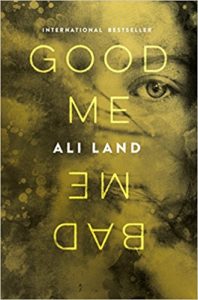
Good Me Bad Me: A Novel
By Ali Land
Milly’s Mom is not like other Moms… She’s a serial killer. After finding the courage to turn in her mother to the police, Milly escapes to live with the perfect foster family. But dark details from her old life back still haunt her. Dark urges plague her, too. Despite her best intentions, Milly’s horrifying past slowly creeps into the present. Preparing to act as a witness at her mother’s criminal trial not only triggers Milly’s PTSD, but also raises uncomfortable questions about Milly’s role in her mother’s killing spree. Was Milly really just a passive victim in her mother’s house of horrors? Or did she participate in the game? Is it possible to be a victim, and a perpetrator? Ali Land’s masterful debut raises these and other groundbreaking questions about the fine line between nature and nurture. With a monster for a mother, can Milly ever truly outgrow the evil she experienced as a child? Or does that same evil live inside of her, too? Good Me Bad Me is an addictive, voice-driven psychological thriller, and a must-read. But not for the faint of heart.
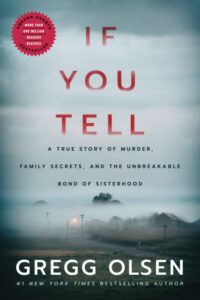
If You Tell: A True Story of Murder, Family Secrets, and the Unbreakable Bond of Sisterhood
By Gregg Olsen
Female psychopath Shelly Knotek brought in boarders who never left her house—and in a grisly twist, she not only tortured her victims, she also brainwashed them into torturing themselves. All the while, Shelly was raising three daughters: Nikki, Sami and Tori. The sisters survived their upbringing, and after more than a decade, they shared their unbelievable true story with the brilliant, best-selling author, Gregg Olsen. This startling gem of a book is equal parts horrifying and empowering. It outlines Shelly’s horrifying crimes in minute detail. But in the end, it’s really a story about the unwavering bond of sisterhood. That’s really all I can say about it. I just love it so much.
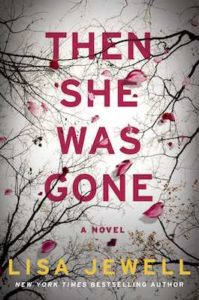
Then She Was Gone: A Novel
By Lisa Jewell
Lisa Jewell is prolific as hell and always manages to produce some new treasure. This book in particular acted as my personal gateway into her entire literary canon—because of it, I’ve read everything else she has ever written. Then She Was Gone tells the strikingly macabre story of 15-year-old Ellie Mack’s disappearance. It’s a gripping mystery told through multiple perspectives, full of richly-drawn female characters. (One of them is very scary.) Ten years after Ellie’s disappearance, her mother Laurel struggles to find closure and seize what life she has left. She starts dating a man named Floyd. But his daughter eerily resembles Ellie, which makes it hard to start over. What follows is a thrill ride of secrets, lies and evil deeds. As we get to the bottom of what really happened to Ellie, each new dramatic twist is surpassed by the next, leading to a shocking conclusion that is, in its own way, also beautiful.
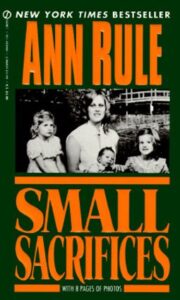
Small Sacrifices
By Ann Rule
If you’re reading this, you probably already know that Ann Rule is the queen and king of true crime. Her book, The Stranger Beside Me is one of the best books ever written, in any genre. Small Sacrifices, her sixth true crime book, is a creative masterpiece about Diane Downs, who shot her three young children, then brought them to the hospital, claiming a maniac (other than herself) had done it. The book explores the various forces in Downs’ life that gave her a motive to murder, and traces law enforcement’s epic quest to prosecute Downs (this was 1983, so DNA was not an option), who was beautiful, captivating, and courted the press to tell her own manipulative version of the story (“They took my kids away!”). It’s a fascinating tale and, as always, Rule is in her element when telling it.
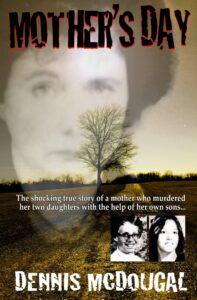
Mother’s Day: The Shocking Story of a Mother Who Murdered Her Two Daughters with The Help of Her Own Sons by Dennis McDougal
In 1985, Theresa Cross stuffed her injured adult daughter into a 2×2 storage locker. “After three days,” the jacket description reads, “the knocking, kicking, and cries stopped.” Mother’s Day unveils the nuanced criminal profile of a powerfully charismatic Mom, with a grisly imagination, who managed to persuade her own sons to commit familicide. Were they psychopaths too, or simply brainwashed pawns in their mother’s game? Read to find out.
***


















